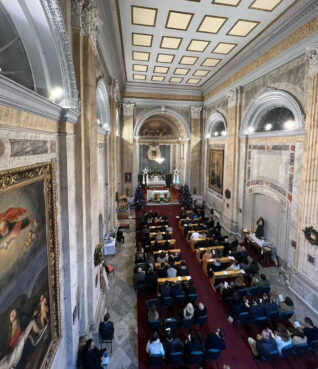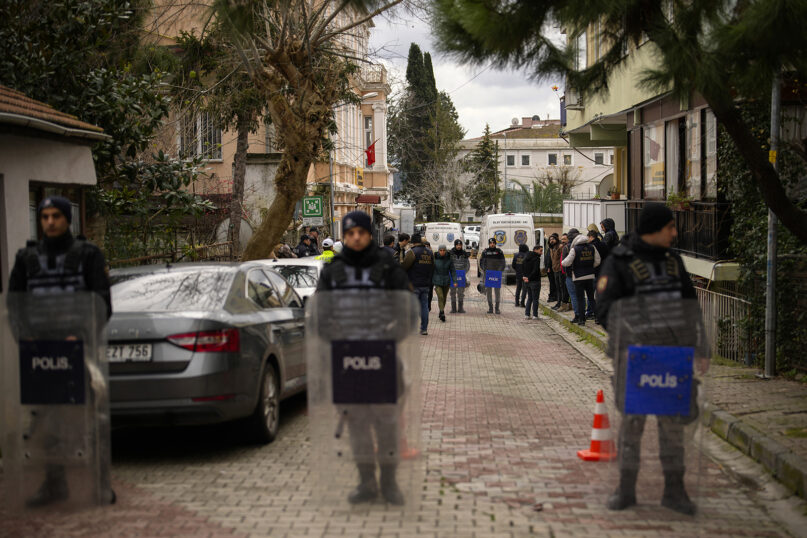ISTANBUL (RNS) — Gunshots rang out during Mass in Istanbul’s Santa Maria Italian Catholic Church Sunday (Jan. 28), as two gunmen assaulted the building, killing one in an attack claimed by the Islamic State group, also known as IS.
According to church leaders, the victim, 52-year-old Tuncer Cihan, was killed after standing up to the gunmen who had entered the church firing into the air and ordering congregants to lie on the ground.
Two suspects have been detained by police, both foreign nationals, according to Turkish Interior Minister Ali Yerlikaya. “One of them is from Tajikistan and the other is Russian, and we evaluated them to be with the Islamic State.”
Cihan was not a Catholic but an Alevi, a Muslim minority in Turkey that is not recognized by the country’s government. Cihan’s funeral was held Monday at an Alevi house of worship, known as a cemevi.
“Basically we have two communities who are today united in sorrow,” the Rev. Luka Refatti, a Catholic priest in Istanbul, told the Religion News Service after attending Cihan’s funeral.
The attack comes after months of raids by Turkey’s state security service, MIT, against cells affiliated with the Islamic State group who were said to be planning attacks against Jewish and Christian sites in Turkey.
Most of the country’s synagogues, which have been targeted in the past by terror groups, have been closed since the outbreak of the Israel-Hamas war in October, but churches are generally open to the public.
According to Yerlikaya, since June more than 2,000 suspects had been detained on suspicion of affiliation with the Islamic State group, resulting in more than 500 arrests. After Sunday’s attack, 30 raids were carried out across the city, resulting in 47 detentions, including the two gunmen.
The attack has the Catholic community reevaluating its open nature, Refatti said.
“It’s the first time we’ve had something like this in Istanbul,” Refatti told RNS. “At this moment we are a little bit in shock; we haven’t had the time to talk to each other yet, but for sure something will change in how we think about our security and the way we keep our churches open.”
Speaking with Vatican media yesterday, Bishop Massimiliano Palinuro, the apostolic vicar of Istanbul, called for increased security measures.

People attend a Christmas season service at Santa Maria Italian Catholic Church in Istanbul, Turkey. The church was attacked during a service on Sunday, Jan. 28, 2024. (Photo by Layla Yediçam)
“We ask for greater security and for the safety of the faithful, of the Christian community, which perseveres in the faith and courageously faces very long journeys at times to attend the Eucharistic celebration,” Palinuro said.
Several-hundred-thousand Christians live in Turkey, most of them in Istanbul, but churches are relatively scarce, even in the cities. Late last year, the Syriac Orthodox community inaugurated Mor Ephrem Syriac Orthodox Church, the country’s first new church of any denomination in more than a century.
As such, Christians of all sects congregate in the few aging churches, often far from where they live.
For that reason, the Santa Maria Church’s priest, the Rev. Anton Bulai, is careful to open his congregation to people of all faiths, including Cihan.
“He’s someone who helps everyone without caring about race and religion,” said congregant Layla Yedicam, referring to Bulai. “He wanted that church to be open to everyone who wanted to come in, but that’s not going to be the case anymore I don’t think.”
A diverse crowd was a hallmark of the church, and the attack has only strengthened her resolve to support it, she added.
“We should not give an early victory to this terror attack by giving in to fear,” Refatti added. “But now we have a little bit to think about and recover from the shock. This is a moment of sorrow and grief.”
While Christianity in Turkey is most associated with the Greek Orthodox Church, whose Ecumenical Patriarch is based in Istanbul, Catholicism’s history in the city stretches back to the Byzantine era. Pope John XXIII was often called “the Turkish Pope” due to his fondness for the country where he served as apostolic delegate during the 1930s and ’40s.
Though Sunday’s attack came as a shock to many of Istanbul’s Catholics, it’s not without precedent. In 2008 an Italian Catholic priest was shot and killed outside his church in the Black Sea city of Trabzon, and in 2010, Luigi Padovese, the apostolic vicar of Anatolia, was stabbed and decapitated by an extremist in southeastern Turkey.
In 1981 it was a Turkish nationalist and gangster, Mehmet Ali Ağca, who attempted to assassinate Pope John Paul II.
Bishop Palinuro called on the community to approach the tragedy as a “time for prayer,” “for solidarity with the Catholic community,” and “for prayer for the person who has died.”





